Thanks to our dedicated community of supporters, the International Rescue Committee (IRC) has been able to ramp up our response to the COVID-19 pandemic and maintain our lifesaving programs in more than 40 countries worldwide.
As the pandemic accelerates in crisis zones, your generosity helps us to broaden our efforts as countries face a double emergency: first, the direct impact of COVID-19 on weak health care systems and vulnerable populations already in crisis; and subsequently, the secondary havoc the disease will cause in these fragile countries, including food insecurity, job and income losses, and increases in gender-based violence.
The IRC is working to meet our initial fundraising goal of $30 million, which will help us fill crucial gaps in the global fight against the coronavirus. With your partnership, we can continue to adapt our programs—and generate new solutions that will help us sustain and expand our support for the world’s most vulnerable.
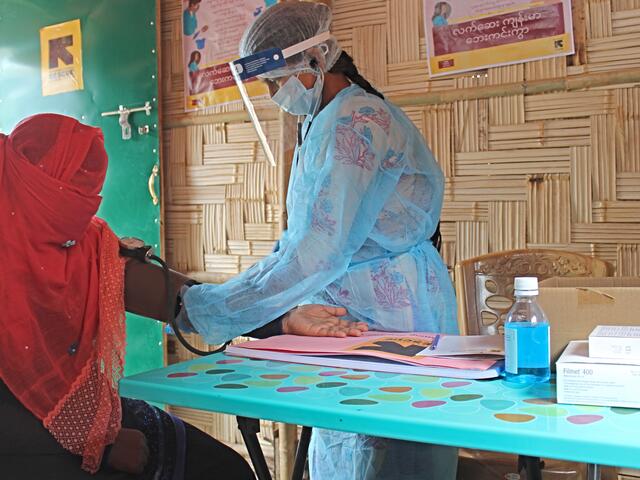
Below, we are pleased to highlight a few generous supporters who have stepped up early on in the crisis, helping us gain momentum so that we can work faster to mitigate the spread of the virus in vulnerable communities. Already, their support has saved more lives, and helped us focus on key areas of need as well as our overall response.
Supporting women and girls on the frontlines
The IRC’s experience suggests that gender-based violence is likely to rise during a COVID-19 outbreak. In South Sudan, women and girls already face some of the highest levels of violence in the world, with 65 percent experiencing violence—and a majority of them don’t have access to services for gender-based violence. This gap will likely grow as the outbreak persists.
In Yemen, the risk of famine and further economic distress will force a vulnerable population to adopt negative coping strategies to survive. Women and girls will be disproportionately affected. Within the first three years of the war in Yemen, there was already a 63 percent increase in gender-based violence and tripling of rates of child marriage and early and forced marriage.
Sheryl Sandberg & Tom Bernthal
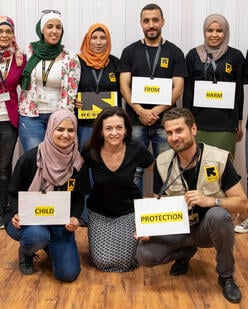
To help empower women and girls during the COVID-19 pandemic, Sheryl Sandberg and Tom Bernthal gave $2.5 million to the IRC. Their gift will strengthen efforts to support women and girls, including preventing domestic violence, providing access to quality health care that includes sexual and reproductive health, and positioning women as leaders in the COVID-19 response.
"Women and girls are on the frontlines of this epidemic," Sandberg said. "They're more vulnerable to disease and poverty and they're essential to delivering health care worldwide and keeping families nourished, educated, and healthy. Supporting them is key to minimizing the harm caused by this pandemic and protecting communities in the long run. We must do all we can to keep women and girls safe and well."
With support like this, the IRC is working to integrate mental health and gender into our response from the outset, so that women and girls are protected from these secondary risks. We’re continuing to provide psychological counseling by phone for survivors of violence, and in places like El Salvador and Honduras, we’re training IRC staff remotely to help implement new safe spaces once movement restrictions are lifted.
Protecting asylum seekers at the U.S.-Mexico border
At the U.S.-Mexico border, asylum seekers and refugees are vulnerable to the same types of exploitation, abuse and violence that forced them to flee their countries in the first place. Conditions are particularly harrowing for women and girls—currently, a woman is murdered every 2.5 hours in Mexico. As people seek shelter to escape violence, they’re now exposed to a new vulnerability: COVID-19.
Jeanine Cummins
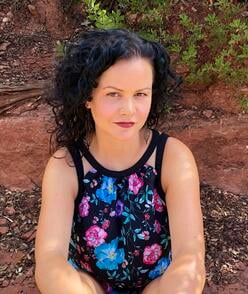
Author Jeanine Cummins hopes to raise and match gifts up to $100,000 in support of the IRC’s programs at the U.S.-Mexico border. As COVID-19 impacts Mexican border towns, U.S. policies like “Remain in Mexico” have left asylum seekers stranded in dangerous, overcrowded conditions. Gifts from Cummins’ fundraiser will help us provide shelters and crisis response services to asylum seekers and vulnerable families.
Cummins shared, “When I visited the borderlands and met with migrants, I felt a tremendous urgency about the situation there. My initial response was a feeling of helplessness, but then I recognized that so many courageous people have already committed their lives to the crucial, lifesaving work of protecting migrants at the U.S.-Mexico border, even in the middle of a pandemic. I chose to partner with the IRC because they have the reach and the expertise to make a real impact in the borderlands.”
As part of our COVID-19 response, with the help of donations like these, the IRC has launched, together with local authorities and civil society partners, a public health awareness and psychosocial support campaign for shelters in Ciudad Juárez, Mexico. This project directly benefits 17 shelters hosting approximately 3,000 people and reaches surrounding host communities—indirectly benefiting an additional 10,000 people. The initiative includes sessions on the transmission of COVID-19, protective and preventive measures, where to access help and support, reinforcement of public health best practices, and the distribution of hygiene kits.
Strengthening our global preparedness and response
A commitment toward our COVID-19 response now will allow the IRC to adapt our existing programs to ensure the continuity of lifesaving activities. With flexible funding, we can scale up frontline responses in local communities and continue to pivot as the situation on the ground evolves and new crises emerge.
The Asness Foundation
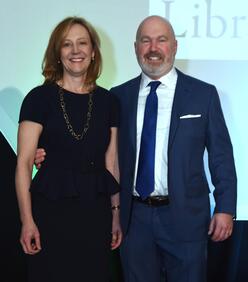
Long-time IRC supporters Cliff and Laurel Asness have made an additional $1 million pledge to help the IRC mitigate the spread of COVID-19, while ensuring our lifesaving programs can continue. Their gift will help us adapt and scale up our work as COVID-19 impacts greater numbers of refugees, displaced families and those living in crisis.
“Laurel and I are in awe of the work being done by the teams on the ground to bring relief and help mitigate the spread of COVID-19. The IRC has been taking on the toughest global crises since its founding, and we are proud to support their commitment to responding to this crisis.”
During this pandemic, a $1 million investment like this could help IRC staff in up to 10 countries adapt and scale up our existing humanitarian programs. Adapting programs allows lifesaving interventions to continue safely and to slow the spread of the virus in affected areas, contributing not only to the fight to stamp out the disease, but also reducing the secondary impacts of the outbreak.
As families in crisis face further threat from COVID-19, help us rescue lives worldwide.
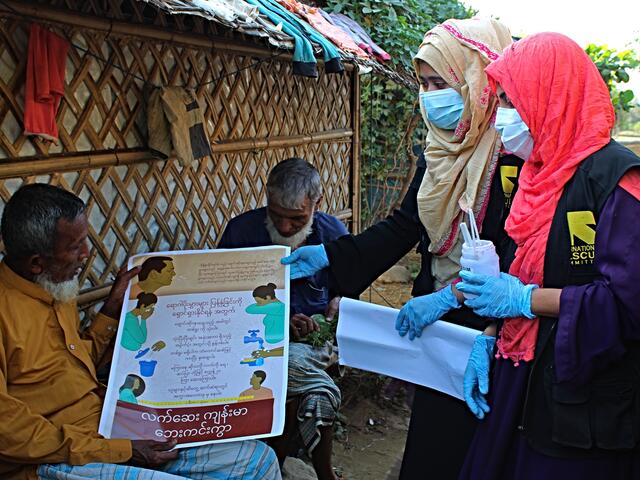
Joining together to make lifesaving difference
Gifts from all our supporters go toward the IRC’s frontline response and global humanitarian work, including:
- In Syria, with the first cases of the disease now confirmed, the IRC is working with the World Health Organization and its partners to contain the virus and minimize its impact on the millions of Syrians who have already suffered under nine years of conflict. In northeast Syria, all of our health facilities are now equipped with protective gear and we are training health workers on how to respond to COVID-19.
- In Colombia, the IRC set up a health call center run by doctors and nurses. People who call in are asked their symptoms, then are referred either to our clinic in Cúcuta or our partner service providers depending on the care they need. We’re also continuing to provide maternal health and emergency cash support to the communities we serve.
- In Seattle, IRC case managers are creating health and hygiene kits for families at higher risk, as well as stocking up emergency food supplies. We are also adapting our services for social distancing in ways that include offering home study packets for students and remote mentoring for youth and adults.
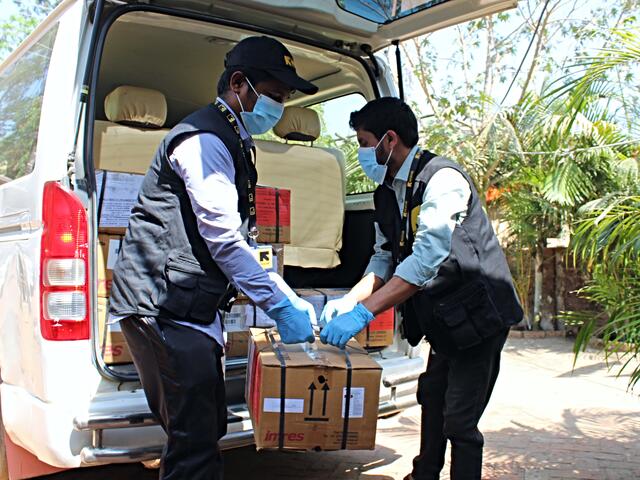
During this challenging time, your support allows our teams to prepare for, prevent and respond to the spread of the coronavirus in crisis-affected countries and deliver urgent aid to refugees and displaced families.
Thank you for standing with us in support of refugees and vulnerable communities worldwide.